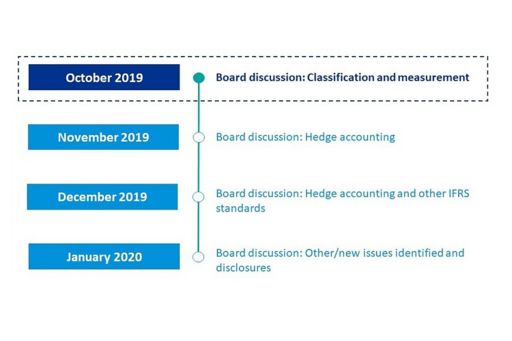IBOR reform – Blueprint for modifications under IFRS® 9
Board debates accounting for modifications to financial instruments relating to IBOR reform
Board debates accounting for modifications to financial instruments relating to IBOR refor
23 October 2019
Highlights
- Potential changes to IFRS 9 to clarify guidance and provide a practical expedient for modifications relating to IBOR reform
- Existing IFRS 9 requirements would apply after the practical expedient for any other modifications
- Next steps – Next Phase 2 issue –hedge accounting – to be discussed at the Board’s November meeting
- Potential changes to IFRS 9 to clarify guidance and provide a practical expedient for modifications relating to IBOR reform
- Existing IFRS 9 requirements would apply after the practical expedient for any other modifications
- Next steps – Next Phase 2 issue –hedge accounting – to be discussed at the Board’s November meeting

Changes to how cash flows are determined – e.g. how the benchmark rate is calculated – would be a modification
With Phase 1 complete and Interest Rate Benchmark Reform – Amendments to IFRS 9, IAS 39 and IFRS 7 issued in September 2019, the International Accounting Standards Board (the Board) has started its deliberations on second-phase issues.
Its first key area of focus in this second phase is classification and measurement of financial instruments or more specifically, how an entity might apply IFRS 9 Financial instruments when dealing with changes to contract terms arising from IBOR reform.
The second phase of the IBOR reform project is on track with the Board’s recent discussion proposing a blueprint for accounting for financial instrument modifications caused by IBOR reform.
Chris Spall,
KPMG’s global IFRS financial instruments leader
What are the potential changes?
During its October meeting, the Board tentatively decided that ‘modifications related to IBOR reform’ are those that will result in changes – on an economically equivalent basis – to the interest rate benchmark on which a financial instrument’s contractual cash flows are based.
In light of this, the Board tentatively decided to propose a practical expedient for these modifications to allow the effective interest rate (EIR) to be updated without adjusting the carrying amount to better reflect the economics of IBOR reform and reduce the operational burden for financial statement preparers.
The Board discussed these issues and tentatively decided the following.
| Issue discussed | Potential amendments to IFRS 9 |
| Is a change in the basis of how a financial instrument’s contractual cash flows are determined a modification under IFRS 9? | A change in the basis of how contractual cash flows are determined from what was originally anticipated, even in the absence of an amendment to the financial instrument itself, is a modification – e.g. a change in the calculation methodology of an IBOR. |
| How might a company account for a modification relating to IBOR reform that will result in changes to cash flows on an economically equivalent basis |
Create a practical expedient allowing companies to apply IFRS 9.B5.4.5 to account for modifications that are related only to IBOR reform instead of IFRS 9.5.4.3. This means that a company would update the EIR based on the revised cash flow, without adjusting the carrying amount rather than recalculating the carrying amount with the original EIR. |
After applying the practical expedient to modifications that relate only to IBOR reform, companies would apply the current IFRS 9 requirements to assess any other modifications to that financial instrument.
What else did the Board discuss?
The Board also discussed certain accounting implications for the classification and measurement of financial instruments when a modification results in derecognition – i.e. the modification is substantial. The Board tentatively decided that the existing IFRS 9 requirements are adequate for:
- derecognising a financial instrument and the related accounting requirements for a substantial modification;
- determining the business model for managing the financial assets;
- determining whether the new financial instrument referenced to alternative benchmark rates meets the SPPI criteria;
- recognising expected credit losses (ECL) for the new financial asset; and
- embedded derivatives for financial liabilities.
However, the Board tentatively decided to add an example to illustrate the application of the SPPI assessment in the context of IBOR reform.
Next steps
The Board did not announce when an exposure draft on these potential changes might be issued and expects to discuss hedge accounting issues that would arise after the implementation of IBOR reform at its next meeting in November.
Look out for further updates and speak to your usual KPMG contact to find out more about the Board’s tentative decisions.

© 2019 KPMG IFRG Limited is a UK company, limited by guarantee. All rights reserved. KPMG IFRG Limited, registered in England No 5253019. Registered office: 15 Canada Square, London, E14 5GL, UK.
© 2019 KPMG International Cooperative (“KPMG International”), a Swiss entity. Member firms of the KPMG network of independent firms are affiliated with KPMG International. KPMG International provides no client services. No member firm has any authority to obligate or bind KPMG International or any other member firm vis-à-vis third parties, nor does KPMG International have any such authority to obligate or bind any member firm. All rights reserved.
Member firms of the KPMG network of independent firms are affiliated with KPMG International. KPMG International provides no client services. No member firm has any authority to obligate or bind KPMG International or any other member firm vis-à-vis third parties, nor does KPMG International have any such authority to obligate or bind any member firm.
© 2024 KPMG Huazhen LLP, a People's Republic of China partnership, KPMG Advisory (China) Limited, a limited liability company in Chinese Mainland, KPMG, a Macau (SAR) partnership, and KPMG, a Hong Kong (SAR) partnership, are member firms of the KPMG global organisation of independent member firms affiliated with KPMG International Limited, a private English company limited by guarantee. All rights reserved.
The KPMG name and logo are trademarks used under license by the
independent member firms of the KPMG global organisation.
For more detail about the structure of the KPMG global organisation please visit https://kpmg.com/governance.